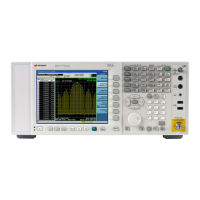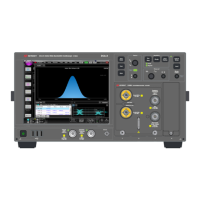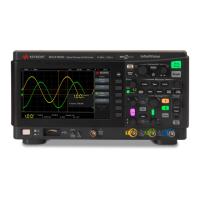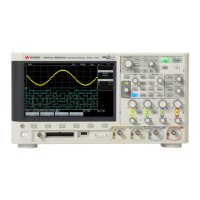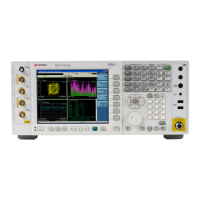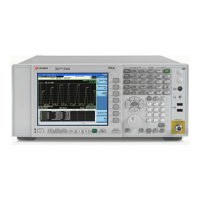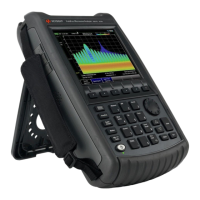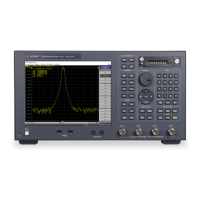3 VMA Mode
3.5 Channel Power Measurement
the SCPI command will be accepted without error but has no effect
Couplings When NFE is enabled in any mode manually, a prompt will be displayed reminding you to perform the
Characterize Noise Floor operation if it is needed. If NFE is enabled through SCPI and a Characterize
Noise Floor operation is needed, an error will be entered in the system error queue
Preset Unaffected by Mode Preset. Turned ON at startup and by Restore Mode Defaults in Modes that
support Adaptive. Turned OFF at startup and by Restore Mode Defaults in Modes that do not support
Adaptive
State Saved No
Remote Command
[:SENSe]:CORRection:NOISe:FLOor:ADAptive ON | OFF | 1 | 0
[:SENSe]:CORRection:NOISe:FLOor:ADAptive?
Example Turn NFE ON (Full mode):
:CORR:NOIS:FLO ON
Set to Adaptive:
:CORR:NOIS:FLO:ADAP ON
Dependencies Only available in Modes that support Adaptive NFE
Only appears in instruments with the NFE or NF2 license installed. In all others, the control does not
appear, but the SCPI command is accepted without error (but has no effect)
Couplings For backwards compatibility, sending :CORR:NOIS:FLO ON turns NFE Adaptive OFF. To turn
Adaptive ON, you must issue the commands in the proper order, as shown in the example above
Preset Not affected by Mode Preset, but set to ON at startup and by Restore Mode Defaults
State Saved No
More Information
The instrument is characterized in the factory (or during a field calibration) with a
model of the noise, referred to the input mixer, versus frequency in each band and
path combination. Bands are 0 (low band) and 1 through 4 (high band) in a 26.5GHz
instrument, for example. Paths include normal paths, preamp paths, the electronic
attenuator, etc.
In most band/path combinations, the noise can be well characterized based on just
two parameters and the instrument frequency response before compensation for
frequency-dependent losses.
After the noise density at the input mixer is estimated, the effects of the input
attenuator, RBW, detector, etc. are computed to get the estimated input-port-
referred noise level.
In the simplest case, the measured power (signal plus instrument noise) in each
display point (bucket) is compensated by subtracting the estimated noise power,
leaving just the signal power. This is the operation when the detector is Average,
and the Average Type is set to Power.
895 Vector Modulation Analyzer Mode User's &Programmer's Reference
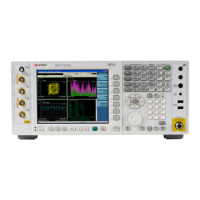
